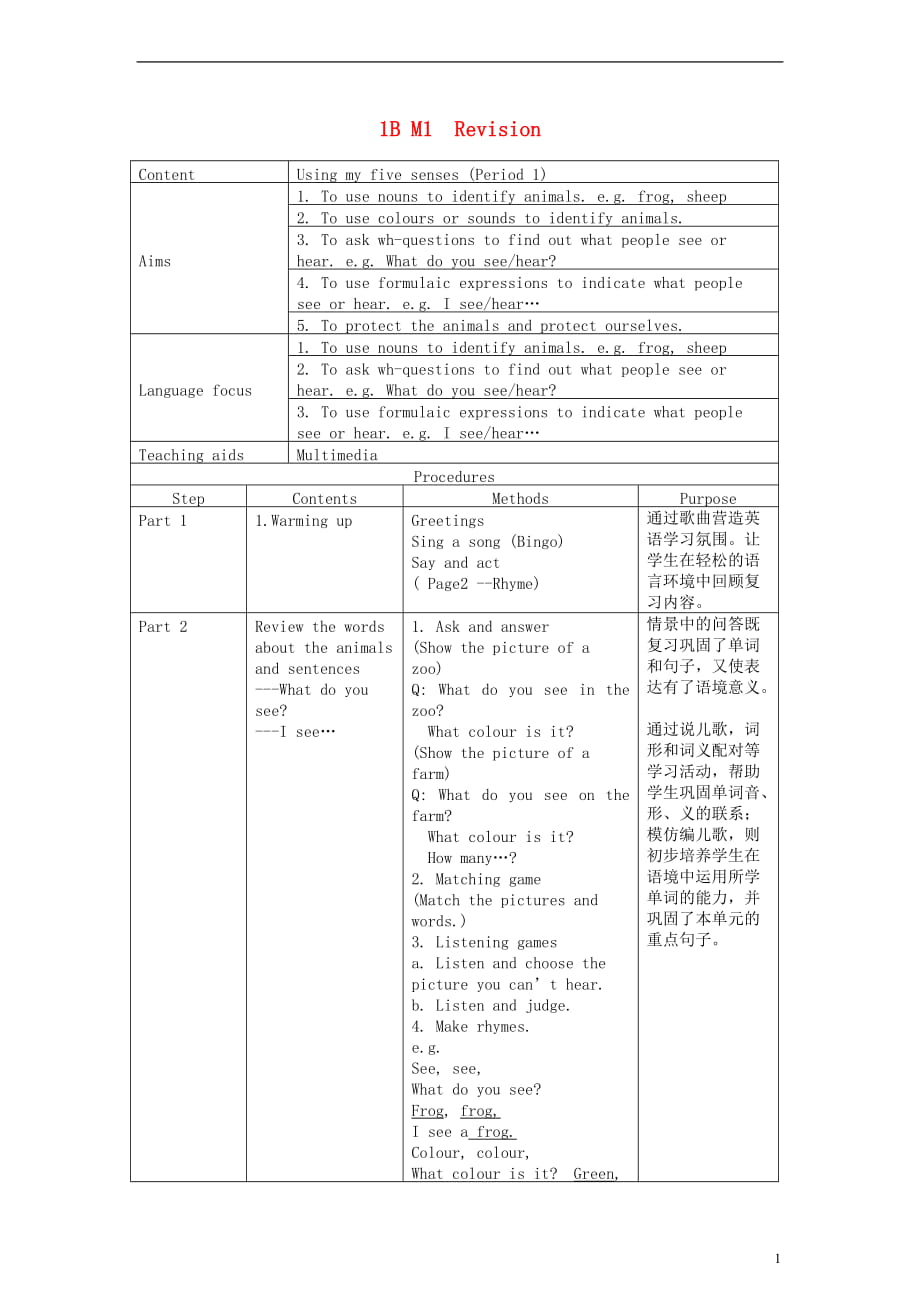《一年級(jí)英語(yǔ)下冊(cè) module1 revision教案 (新版)滬教牛津版》由會(huì)員分享,可在線閱讀��,更多相關(guān)《一年級(jí)英語(yǔ)下冊(cè) module1 revision教案 (新版)滬教牛津版(3頁(yè)珍藏版)》請(qǐng)?jiān)谘b配圖網(wǎng)上搜索���。
1����、
1B M1 Revision
Content
Using my five senses (Period 1)
Aims
1. To use nouns to identify animals. e.g. frog, sheep
2. To use colours or sounds to identify animals.
3. To ask wh-questions to find out what people see or hear. e.g. What do you see/hear?
4. To use formulaic expressions to i
2��、ndicate what people see or hear. e.g. I see/hear…
5. To protect the animals and protect ourselves.
Language focus
1. To use nouns to identify animals. e.g. frog, sheep
2. To ask wh-questions to find out what people see or hear. e.g. What do you see/hear?
3. To use formulaic expressions to indic
3�、ate what people see or hear. e.g. I see/hear…
Teaching aids
Multimedia
Procedures
Step
Contents
Methods
Purpose
Part 1
1.Warming up
Greetings
Sing a song (Bingo)
Say and act
( Page2 --Rhyme)
通過(guò)歌曲營(yíng)造英語(yǔ)學(xué)習(xí)氛圍。讓學(xué)生在輕松的語(yǔ)言環(huán)境中回顧復(fù)習(xí)內(nèi)容�。
Part 2
Review the words about the animals and sentences
---
4、What do you see?
---I see…
1. Ask and answer
(Show the picture of a zoo)
Q: What do you see in the zoo?
What colour is it?
(Show the picture of a farm)
Q: What do you see on the farm?
What colour is it?
How many…?
2. Matching game
(Match the pictures and words.)
3. Listening games
5��、
a. Listen and choose the picture you can’t hear.
b. Listen and judge.
4. Make rhymes.
e.g.
See, see,
What do you see?
Frog, frog,
I see a frog.
Colour, colour,
What colour is it? Green, green,
It’s green.
情景中的問(wèn)答既復(fù)習(xí)鞏固了單詞和句子���,又使表達(dá)有了語(yǔ)境意義�����。
通過(guò)說(shuō)兒歌���,詞形和詞義配對(duì)等學(xué)習(xí)活動(dòng)�����,幫助學(xué)生鞏固單詞音�、形�、義的聯(lián)系;模仿編兒歌���,則初步
6、培養(yǎng)學(xué)生在語(yǔ)境中運(yùn)用所學(xué)單詞的能力����,并鞏固了本單元的重點(diǎn)句子。
Review the sounds animals make and the sentences (What do you hear? I hear…)
1. Guessing game
What do you hear?
2. Say the rhyme
(Workbook page 6)
3. Make a rhyme
通過(guò)聽(tīng)各類(lèi)動(dòng)物的叫聲���,復(fù)習(xí)動(dòng)物類(lèi)單詞和hear的句子�。
朗誦和創(chuàng)編兒歌的學(xué)習(xí)活動(dòng)使單詞和句子有了結(jié)合���。
Part 3
1. Riddles about animals
2. Look
7���、and say
Listen and guess
Look and say
通過(guò)聽(tīng)四則有關(guān)動(dòng)物的謎語(yǔ)����,培養(yǎng)學(xué)生初步理解小語(yǔ)段的能力����。通過(guò)圖文結(jié)合的形式,讓學(xué)生嘗試表達(dá)完整的語(yǔ)句�。
Part 4
1. Listen and follow the tape P2-9
2. Draw an animal and describe it at least three sentences
板
書(shū)
設(shè)
計(jì)
What do you see? I see...
What do you hear? I hear...
教
學(xué)
反
思
8、
1B M1 Revision
Content
Using my five senses (Period 2)
Aims
1. To use nouns to identify food items. e.g. soup, noodles
2. To use imperatives to give simple instructions.
e.g. Taste/Smell…
3. To act out the short dialogue at the restaurant.
4. To educate the pupils to be polite to
9��、 the others and not to waste food.
Language focus
1. To use nouns to identify food items. e.g. soup, noodles
2. To use imperatives to give simple instructions.
e.g. Taste/Smell/Touch…
Teaching aids
Multimedia
Procedures
Step
Contents
Methods
Purpose
Part 1
1.Warming up
Greetings
Quic
10�����、k Response
(Listen and act)
Sing a song
(Food I like)
快速反應(yīng)游戲能讓學(xué)生快速進(jìn)入學(xué)習(xí)狀態(tài)���,也是對(duì)本單元句子的復(fù)習(xí)����。
以歌曲形式幫助學(xué)生回顧本單元單詞�。
Part 2
Review the words about the food
1. Ask and answer
(Show some pictures of food)
Q: What do you see?
What do you like?
2. Matching game
a. Match the pictures and words.
b. R
11、ead and categorize
Fruit shop: apple…
Snack bar: pizza…
Restaurant: soup…
情景中的問(wèn)答既復(fù)習(xí)鞏固了單詞和句子���,又使表達(dá)有了語(yǔ)境意義�����。通過(guò)圖詞配對(duì)�,幫助學(xué)生鞏固單詞音、形��、義的聯(lián)系�;通過(guò)單詞(配圖)歸類(lèi)游戲,復(fù)習(xí)�����、鞏固��、拓展食物類(lèi)單詞
Review the sentences:
Taste/Smell…
1. Say the rhyme(P13)
2. Look and say
通過(guò)誦讀兒歌����,鞏固句子結(jié)構(gòu)�����;通過(guò)看圖(動(dòng)作)表達(dá)����,提高學(xué)生在情景中理解句意和表達(dá)的能力���。
Practice
12、the dialogue
(Introduce the situation: Eat out at the restaurant)
1. Watch and listen
2. Listen and number
3. Work in group
4. Act out the dialogue
運(yùn)用多媒體創(chuàng)設(shè)在飯店用餐的情景和語(yǔ)境�����,把語(yǔ)言點(diǎn)串成一個(gè)主題��,讓學(xué)生在看看�、聽(tīng)聽(tīng)、說(shuō)說(shuō)中感知�����、理解�、掌握語(yǔ)言。
Part 3
Make a dialogue
1. Say and act
通過(guò)模仿自編對(duì)話�,初步培養(yǎng)學(xué)生同伴合作能力和會(huì)話能力。
Part 4
1. Listen and follow the tape P10-13
板
書(shū)
設(shè)
計(jì)
rice
Taste the ... egg
soup
Smell the ... noodles
教
學(xué)
反
思
3
 一年級(jí)英語(yǔ)下冊(cè) module1 revision教案 (新版)滬教牛津版
一年級(jí)英語(yǔ)下冊(cè) module1 revision教案 (新版)滬教牛津版

